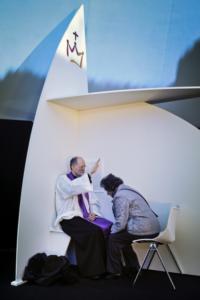Pope Francis shines a light on mercy
Pope Francis has called for an extraordinary Jubilee Year--typically, Jubilees are held every 25 years (the most recent was in 2000) but Pope Francis called this one a bit early and for good reason--what the world needs now is mercy, sweet mercy.
Pope Francis has made headlines for declaring that during this Jubilee year (which begins on the feast of the Immaculate Conception, December 8), all priests will be granted the necessary faculties to absolve women who have had abortions. Bishops, in fact, are the only priests who can forgive all sins in the confessional; Christ granted the apostles the ability to forgive sins (John 20:23), and bishops, as the successors of the apostles themselves, may grant priests the ability to forgive sins in order to better serve the needs of the faithful (if you think Confession lines are long now, imagine what they would look like if you could only confess to a bishop). What Pope Francis did was what Pope Francis does best--he took over 2000 years of Church tradition and he made it accessible. He reminded us what Christ would do. Pope Francis, ever seeking to meet people where they are so that he may lead them to Christ, is using this Jubilee Year of Mercy to reaffirm that all among us are worthy of mercy and forgiveness. We just need to seek it.
This reaffirmation of mercy and grace comes at a most poignant time. We've witnessed recently the horrors that come with our culture of convenience--video after video of Planned Parenthood officials discussing the harvesting and selling of baby body parts. People on all sides of the abortion debate are disturbed by the content of these videos and the complete disregard for humanity that they belie. Often, when atrocities like these surface, we are moved to seek vengeance and retribution. We vehemently condemn anyone and everyone who is involved in the process. When abortionist Kermit Gosnell was found guilty of countless murders of born-alive babies, many were calling for the death penalty. But is that the way of Christ? Would Christ have answered death with death? Would Christ have let any sin go unforgiven if a person had expressed true contrition?
I've written recently that in the midst of our horror at these atrocities we need to remember and pray for women who have had abortions; we need to be beacons of mercy and love. Pope Francis wrote in his letter, "I am well aware of the pressure that has led them to this decision. I know that it is an existential and moral ordeal. I have met so many women who bear in their heart the scar of this agonizing and painful decision." This is Christ in John 8; he meets the woman caught in adultery, does not condemn her, but tells her, "Go forth and sin no more." He meets a sinner with love and mercy--not condemnation. So must we, since we are all sinners.
The Jubilee Year of Mercy kicks off on December 8, the Feast of the Immaculate Conception. On that day we celebrate that Mary was conceived in a state of grace, without original sin. In her sinless perfection, Mary was able to bear Christ into the world. Free of the selfishness, egoism, and pride that is the hallmark of human nature, Mary had room for Christ and His will. And so it is with us. We desperately need the gift of mercy and forgiveness, to wipe out the guilt and pride that is crowding out God's love in our lives. There is great power in redemption. On March 25, 1984, Pope John Paul II consecrated the world to the Immaculate Heart of Mary. His prayer ended, "Let there be revealed, once more, in the history of the world the infinite saving power of the Redemption: the power of merciful love! May it put a stop to evil! May it transform consciences! May your Immaculate Heart reveal for all the light of hope!"
Amen.
Jennifer Manning is a Catholic schoolteacher in Massachusetts and a volunteer with Catholic Voices USA.



















